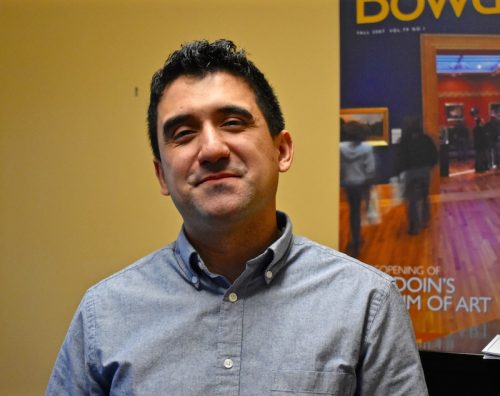Four Students Selected as Bowdoin’s First Multifaith Fellows
By Rebecca Goldfine
The four students participating in Bowdoin’s new Multifaith Fellowship program come from very different backgrounds from one another. One was raised in a Christian family, and defines herself as a “liberal woman of color.” Another grew up in a non-religious household but has taken classes at Bowdoin on Islam, Buddhism, Judaism, and Christianity. A third identifies as a gay Catholic who grew up in the South. And the fourth, while from a Catholic Hispanic family, says he became detached from his faith until taking a class here called Gender in the Middle East, which reignited his interest in religion.
Eduardo Pazos Palma, who oversees the Multifaith Fellowship as Bowdoin’s director of religious and spiritual life, said he it was not necessary that the fellows have a religious upbringing. Rather, he selected the four students, from a pool of twenty eight who applied, based on their “desire to explore religious belief and traditions."
“I was looking for students who understand that it is important as global citizens—who are interested in politics, economics, leadership, and even public health, to have a grasp of religious traditions and how they play a role in people’s everyday lives,” Pazos Palma said. “We will not be trying to figure out what is right or what is wrong; we’ll be trying to figure out what do people around the world think and how does what they think affect their everyday choices.”
Over the course of the fall semester, the four mutlifaith fellows—Caleb Perez ’20, Abigail Wu ’21, Lucas Johnson ’22, and Nick Suarez ’21—will meet weekly for ninety minutes. They’ll be assigned readings, mostly from the world’s sacred texts, and gather for discussions on Islam, Judaism, Christianity and Catholicism, Buddhism, and Hinduism. Community faith leaders will occasionally join them. Pazos Palma said they’ll also devote some time to discussing the role of religion at Bowdoin.
“The thing that really fascinates me about religion the combination of its ability to shape and influence the lives of people and cultures with its tremendous adaptability and versatility. Islam for example, has in different times and places had a hand scientific discovery, militant terrorism and the civil rights movement.” —Multifaith fellow Caleb Perez ’20
The reason the program is small this year, with only four students, is because Pazos Palma decided to give each participant a $750 award. This funding came from an Interfaith Youth Core grant. “We wanted to make the award substantial enough so students could be engaged and not have to work two or three other jobs,” Pazos Palma said.
Additionally, each of the fellows will be responsible for organizing an event or program on campus next semester that builds on the knowledge they acquire this semester. This program could be, perhaps, a campus speaker, an art exhibition, or a discussion organized at one of the College houses, Pazos Palma suggested.
The Multifaith Fellowship will not only provide students with insights into the world’s major religions and practitioners, but may also help them reach across other divides. “I think if we can develop these skills of multifaith engagement, they apply to multiracial engagement, multi-political party-affiliation engagement, and multinational engagement,” Pazos Palma said.